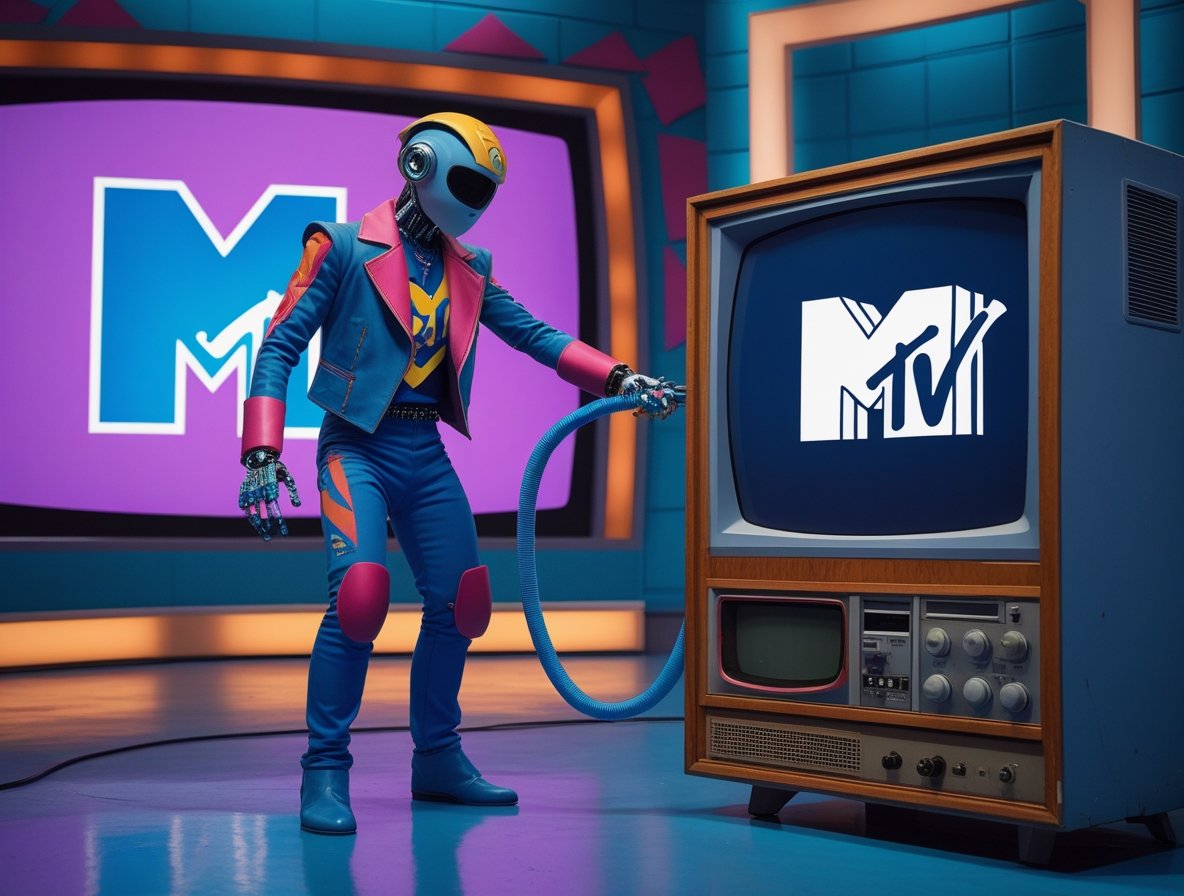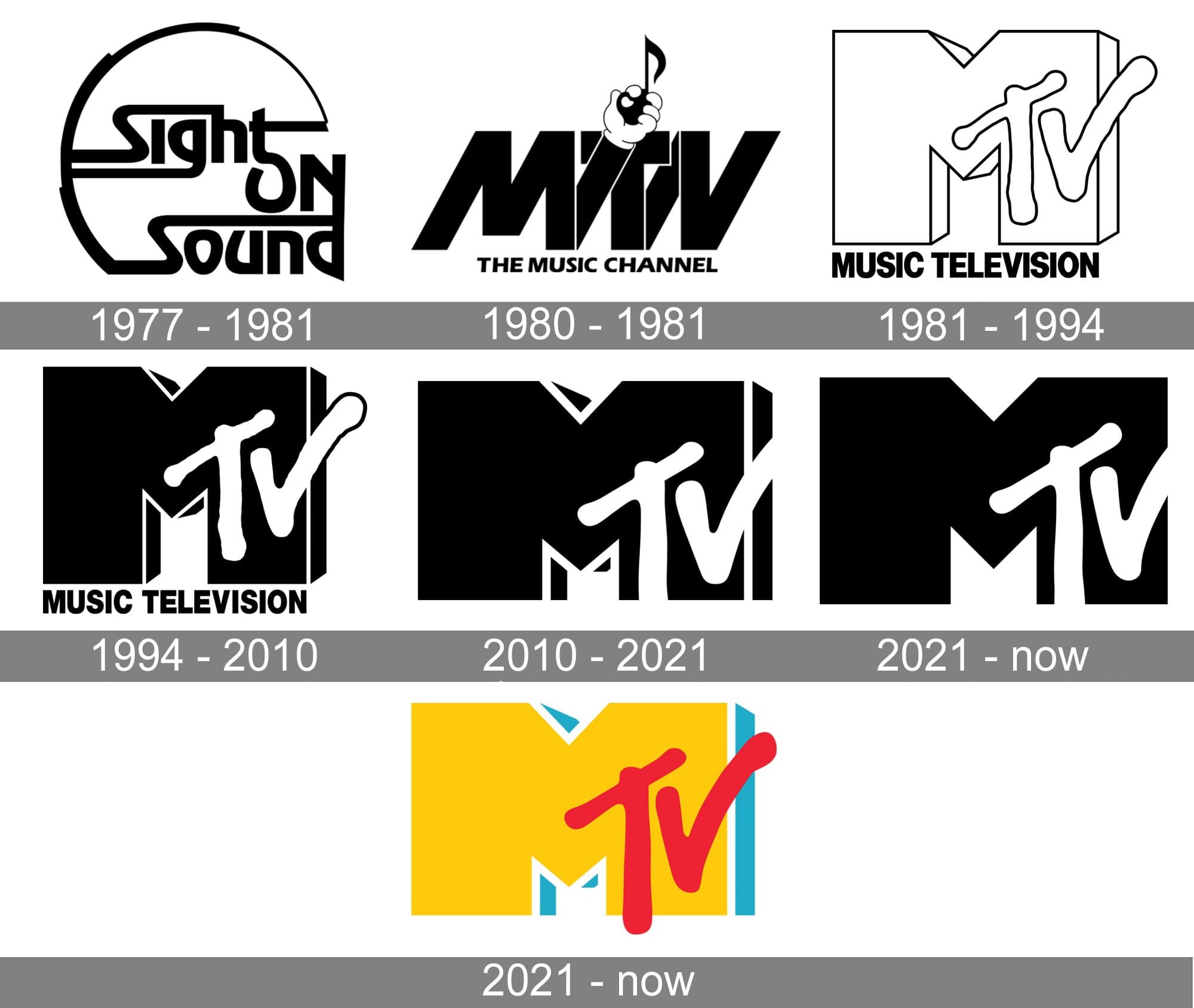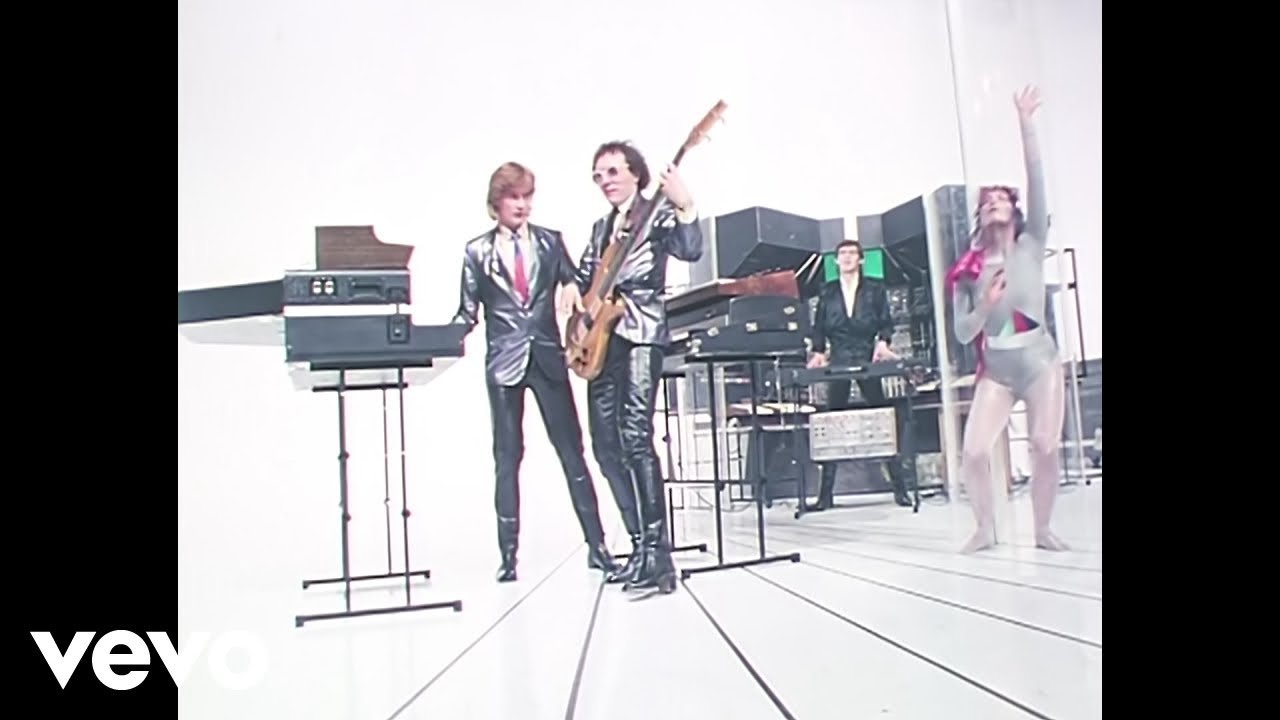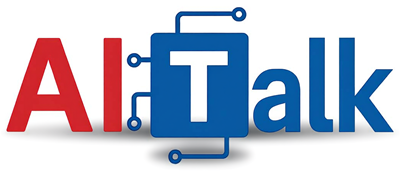'AI Killed the MTV Star': AI Shuts Down MTV

On August 1, 1981, at 12:01 AM, MTV launched its broadcast with a music video that today sounds like a reversed prophecy. "Video Killed the Radio Star" by The Buggles was the statement of intent for a new era, one in which music was no longer just heard, but also watched. The lyrics spoke of nostalgia for the radio era, overwhelmed by the advent of video.
Yet, with an irony that would have made even Philip K. Dick smile bitterly, history took a different turn. In 2025, radio is in excellent health, with solid listenership and a loyal audience, while MTV is shutting down its music channels one after another. Video didn't kill the radio star. But something else killed MTV.
That something has the aseptic face of the artificial intelligence algorithms that now govern YouTube, Spotify, and TikTok. And this is not an article of television nostalgia, but of technology. Because behind the closure announced by Paramount Global of five MTV music channels by December 31, 2025, there is a silent revolution that has redefined the way we discover, listen to, and consume music. A revolution rooted in machine learning and recommendation systems, not in audience preferences for reality shows.
The End of an Era
Paramount's announcement marks the end of broadcasts for MTV Music, MTV 80s, MTV 90s, Club MTV, and MTV Live. We are not talking about marginal markets: the closure involves the United Kingdom, Ireland, France, Germany, Austria, Poland, Hungary, and will extend to Australia and Brazil. The main MTV HD channel will survive, but as a zombie version of itself, focused on entertainment programs and reality shows that have little to do with music. As a final cherry on the cake of decline, Paramount has also canceled the 2025 edition of the MTV Europe Music Awards, once one of the most anticipated events of the year for the European music audience.
The official reason is what one would expect: the need to cut about $500 million in costs in a shrinking television market. But to say that MTV is closing because people no longer watch music TV is like saying the dinosaurs went extinct because it was cold. It's true, but it doesn't tell the whole story. The real mass extinction occurred at a deeper level, in the technological substrate that determines how and what we listen to.

The Invisible Revolution of Algorithms
At first glance, this might seem like a topic far from the core business of a technology portal. MTV is television, twentieth-century stuff, media dinosaurs that failed to evolve. But looking deeper, the closure of MTV is the most evident testimony of how artificial intelligence has already radically transformed entire sectors of our cultural life, often without us realizing it. We are not talking about ChatGPT or deepfakes, we are talking about recommendation algorithms that work in the background, invisible but omnipresent, redefining our musical tastes for over a decade.
When MTV began broadcasting in 1981, music discovery was an intrinsically social and human-curated process. There were VJs, video jockeys like Martha Quinn or Mark Goodman, or some time later the Italian Andrea Pezzi, who selected what to air, created narrative flows between one video and another, and made you discover the Talking Heads right after Madonna. There was a human element of curation, an editorial taste, a vision. Even when that vision was questionable or controversial, as when MTV was accused of racism for the scarce presence of African-American artists in its early years, it remained a process mediated by human choices, criticizable and debatable, but transparent.
Today, that process has been replaced by machine learning systems that analyze billions of behavioral data points. YouTube's algorithm doesn't just suggest videos similar to those you've already watched: it builds a psychographic profile of your musical preferences by cross-referencing viewing time, the moments you pause, when you abandon a video, what you search for next, and what users with similar consumption patterns listen to. Spotify uses hybrid recommendation systems that combine collaborative filtering, audio content analysis via convolutional neural networks that recognize musical patterns, and natural language processing to analyze how users talk about music on social media.
It's fascinating technology, of course. But it is also technology that has made MTV's broadcast model obsolete. Why watch a linear stream of music videos chosen by someone else when you can have a personal algorithmic DJ who knows your tastes better than you do yourself? It's as if Skynet had decided to become a music critic instead of exterminating humanity.
From Broadcast to Personalized Unicast
The epochal shift that MTV failed to manage is the one from broadcasting to algorithmic unicasting. MTV broadcast the same stream to millions of people simultaneously. It was one-to-many, a shared square where an entire generation watched the same videos at the same times. This created a common culture, shared references, collective conversations. Remember when everyone was talking about the same video the next day? I do, fortunately, or unfortunately... That was the power of broadcast.
Digital platforms have pulverized this model. YouTube generates over a billion hours of music video content viewed daily, but no one is watching the same stream. Everyone has their own personalized feed, their own unique mix. TikTok has taken this logic to the extreme with its For You Page, an endless stream of short content where AI decides in real time what to show you based on micro-interactions measured in milliseconds of attention. It is no longer one-to-many, it is one-to-one, multiplied by billions.
This has also redefined what "watching music" means. On MTV, you watched a four-minute music video from start to finish. On TikTok, songs are fragmented into 15-30 second snippets, remixed, reinterpreted, turned into memes. The algorithm learns not only if you like a song, but which specific fragment of that song captures your attention. It is analytical granularity taken to a level that MTV's programmers could never have imagined.
The Numbers of a Mass Emigration
The data on the decline of traditional music TV is ruthless. According to market research cited in Paramount's announcement, the vast majority of the young audience under 35 has never watched a music television channel. Not out of ideological choice, but simply because the very idea of waiting for a video you're not interested in to pass to see the one you want is as alien as using a dial-up modem to download a song.
YouTube Music has over 100 million paying subscribers, Spotify exceeds 600 million active users. But what is more significant is the time spent: the average user spends over 2.5 hours a day on these platforms, compared to the few residual minutes of traditional music TV. And it's not just a matter of convenience or on-demand access. It's that these platforms have built ecosystems where AI acts as the glue between discovery, listening, sharing, and content creation.
Music has become ambient, always available, personalized for every moment of the day. Spotify has algorithmically generated playlists for "Concentration," "Workout," "Chill Evening." YouTube suggests music videos based not only on your tastes, but on the context: time of day, device you're using, whether you're watching on TV or smartphone. MTV aired the same videos at noon and at midnight, to a student and a night worker. It was democratic but rigid. AI is flexible but fragmented.

The Paradox of Algorithmic Discovery
And this is where we get to the heart of the matter, to the doubt that should make us reflect as MTV shuts down. Are algorithms really better than human VJs at helping us discover new music? Or are we trading cultural biodiversity for an algorithmic monoculture disguised as personalization?
A study published in Scientific Reports in 2025 analyzed billions of listens on music streaming platforms, discovering something disturbing. Yes, algorithms expose users to a higher number of different artists than traditional radio. But these artists are "semantically confined," meaning they belong to increasingly narrow and homogeneous niches. In other words: you discover more bands, but they all sound substantially the same.
The problem is called the "musical filter bubble," and it works like this. The algorithm starts with your first musical choices and builds a profile. Then it suggests content that maximizes the probability that you will continue to listen, because its goal is to keep you on the platform. To do this, it privileges familiarity over radical novelty. It suggests artists who are different enough to seem like a discovery, but similar enough not to risk you abandoning the listen. It is the logic of the algorithmic comfort zone.
A study presented at the ACM Web Conference 2024 showed that traditional recommendation systems significantly reduce "inter-user" diversity (the differences between the tastes of different people) without proportionally increasing "intra-user" diversity (the musical variety that each individual listener experiences). Translated: we all end up listening to an increasingly similar mix, while each of us explores an increasingly narrow territory.
MTV, with all its limitations and questionable choices, forced you into a form of serendipity. You turned on the TV to see Duran Duran and you found Sonic Youth, whether you liked it or not. Maybe you changed the channel annoyed, or maybe you discovered something you would never have looked for on your own. It was a "push" discovery model based on human curation. The algorithm, on the other hand, is "pull": it starts from where you already are and takes you where it wants you to go, creating the illusion that you are choosing freely.
A 2024 study on the homogenization of pop music showed how social media algorithms create a dangerous feedback loop: they reward mainstream content with broad appeal, artists and producers learn what works algorithmically and produce music optimized for algorithms, which in turn reward this music because it performs well, in a cycle that tends towards standardization. It's as if we were raising music in batteries instead of free-range in the fields.
The human VJ could be wrong, have prejudices, make horrible choices. But he also had the opportunity to make courageous choices, to put an experimental video in rotation because he believed in it, to create unexpected connections between different genres. The algorithm optimizes for engagement, not for cultural discovery. And this is a fundamental difference that we risk understanding too late.
Video Didn't Kill the Radio Star
There is one last irony in this story that is worth highlighting. Radio, the one The Buggles declared dead in 1981, has survived and is healthy. According to 2025 data, radio still reaches 90% of the adult population in many Western countries, has managed to integrate into the digital world with streaming, podcasts, and apps. Human radio DJs continue to help discover music, create narrative flows, and be recognizable voices with a personality.
MTV, on the other hand, is closing because it remained anchored to the linear broadcast model without evolving. It failed to become a digital platform, it did not build competitive algorithms, it did not understand that the future was not simply putting its content online, but completely rethinking what it means to curate and discover music in the age of AI.
Radio evolved because it understood that its value was not in the technological medium but in the human relationship, in the voice of the DJ you know and trust, in the community of listeners. MTV believed that its value was in controlling the television distribution channel, and when that channel became obsolete, it had nothing else.
Perhaps in a few years we will realize that even algorithmic personalization has its limits, that cultural biodiversity needs human curators who make seemingly inefficient but culturally vital choices. Perhaps we will discover that the friend who makes you listen to that strange band you would never have looked for on Spotify, or the radio DJ who surprises you with a track outside your algorithmic profile, played an important ecological function in keeping a diverse musical ecosystem alive.
But for now, as MTV shuts down its last music channels and Paramount promises that the brand will live on "in the digital world," the reality is that video didn't kill the radio star. It was artificial intelligence algorithms that killed the MTV star. And this, with all due respect to The Buggles, is the last music video worth watching before the broadcasts cease permanently on December 31, 2025. "AI killed the MTV star." And it is not yet clear whether we should consider it progress or a loss.
